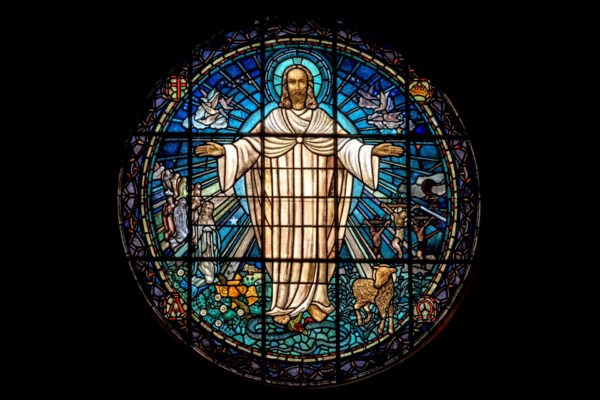The call to holy living is made repeatedly throughout Paul’s first epistle to the Thessalonians. Though the church was already known for their work of faith, labor of love, and steadfastness of hope (1 Thess. 1:3), Paul nevertheless reminds them that the will of God is their sanctification (4:3). They had already been charged to walk in a manner worthy of the God who had called them by grace into his own kingdom and glory (2:12), yet Paul writes to remind them that they had not been called “for impurity, but in holiness” (4:7). In typical Pauline fashion, he then concludes his letter with specific exhortations to holiness (4:1-5:22).
The unmistakable impression we are given—not just in this particular letter but throughout all Scripture—is that Christians are responsible for their progress in sanctification. We must strive for holiness (Heb. 12:14). Only those who endure to the end will be saved (Matt. 24:13). But just before he finishes writing to this rather exemplary church, Paul includes a short prayer in verses 23-24 that seems to place the burden of sanctification elsewhere. Here, however, we discover the doctrine of the preservation of the saints: that those whom God calls and justifies, he also sanctifies.
May God Himself Sanctify You: Preserving Grace
Now may the God of peace himself sanctify you completely, and may your whole spirit and soul and body be kept blameless at the coming of our Lord Jesus Christ (1 Thess. 5:23).
Paul is praying that God himself would sanctify his people, his chosen saints, his called-out church. He’s praying that God would keep the entirety of their being blameless till the coming of Christ. So, who is responsible for the work of sanctification? The believer or God? The called or the Caller? The answer is a resounding “yes!” Of course, we understand that in justification our works have no place at all; it is a monergistic work. We also know that in sanctification our works are necessary; it is a synergistic work. By the power of Spirit we must kill sin, put off the old man, cast off the works of darkness, and walk in the light.
However, as Paul prayer here implies, it is ultimately our triune God who empowers us to do these things. It is only by his preserving grace that we are enabled to walk in holiness. Sanctification is the work of God within us that is worked out by us. Paul makes this abundantly clear elsewhere when he writes: “Work out your own salvation with fear and trembling, for it is God who works in you, both to will and to work for his good pleasure” (Php. 2:12-13; see also 1 Cor. 15:9-10). Until the day when the Lord Jesus Christ returns, we are to walk worthy of our calling in complete reliance upon the grace of God that is at work within us. This verse, then, is a powerful and necessary prayer to pray!
But Paul is not simply expressing a mere wish that God would lend a helping hand with their sanctification. No; he is praying with the utmost confidence.
The Caller Is Faithful
He who calls you is faithful (1 Thess. 5:24a).
Paul grounds his prayer in the faithfulness of God. But before we consider the implications of this truth, notice first that God is referred to as the one “who calls you.” But what “call” is Paul referring to here? While Jesus does mention that “many are called, but few are chosen” (Matt. 22:14), the word ‘call’ means more than just a general invitation. John Murray writes: “The terms for calling, when used specifically with reference to salvation, are almost uniformly applied, not to the universal call of the gospel, but to the call that ushers men into a state of salvation and is therefore effectual” (Redemption: Accomplished and Applied, 91-92). This call is the call of God into the fellowship of his Son (1 Cor. 1:9), into his marvelous light (1 Pet. 2:9), and to eternal life (1 Tim. 6:12). It is the call of God that brings the dead to life and things into existence that do not exist (Rom. 4:17). It is the call we see Timothy 1:9: “He saved us and called us to a holy calling, not because of our works but because of his own purpose and grace, which he gave us in Christ Jesus before the ages began.”
In other words, this is the effectual call of God by which he summons his people, drawing them to himself in repentance and faith. J. I. Packer gives a helpful description of the effectual call:
Original sin renders all human beings naturally dead (unresponsive) to God, but in effectual calling God quickens the dead. As the outward call of God to faith in Christ is communicated through the reading, preaching, and explaining of the contents of the Bible, the Holy Spirit enlightens and renews the heart of elect sinners so that they understand the gospel and embrace it as truth from God, and God in Christ becomes to them an object of desire and affection. Being now regenerate and able by the use of their freed will to choose God and the good, they turn away from their former pattern of living to receive Jesus Christ as Lord and Savior and to start a new life with him (Concise Theology, 153).
This call is a crucial element in God’s unbreakable chain of salvation, which brings us back to the ground of Paul’s prayer in the faithfulness of God for the Thessalonians’ sanctification.
He Will Surely Do It
He who calls you is faithful; he will surely do it (1 Thess. 5:24).
Here is the hope, the assurance, the peace, and the security of the believer—the very power behind the perseverance of saints. The God who calls us to salvation is the ever-faithful, covenant-keeping, unchanging God. He is faithful not only to forgive us our sins but to sanctify us and keep us blameless until we are glorified at the second coming of Christ. Paul’s confidence here is also expressed in his letter to the Philippians: “I am sure of this, that he who began a good work in you will bring it to completion at the day of Jesus Christ” (Php. 1:6).
Perhaps the most powerful argument for the effectual call of God is found in Romans 8:30: “Those whom he predestined he also called, and those whom he called he also justified, and those whom he justified he also glorified.” Our faithful God simply cannot fail to bring his people to himself. The God who called us by his grace has not left our sanctification up to chance; those whom he called he also sanctified. In fact, when we repent and place our faith in Jesus for “salvation,” we are essentially trusting in Jesus for full, eschatological salvation; we are believing the promise of God that he will “sustain us to the end, guiltless in the day of our Lord Jesus Christ” (1 Cor. 1:8)!
The Sanctified: Trophies of God’s Preserving Grace
This brief discussion of 1 Thessalonians 5:23-24 is not intended to be an exhaustive defense of a Calvinistic doctrine; this is simply a restatement of a Pauline doctrine, which he first received from his risen Lord! Jesus himself declared: “This is the will of him who sent me, that I should lose nothing of all that he has given me, but raise it up on the last day” (John 6:39); “I give [my sheep] eternal life, and they will never perish, and no one will snatch them out of my hand” (10:28). For Jesus to lose even one of those given to him by the Father to raise on the last day would mean a failure to accomplish the will of his Father.
Of course, this is a mysterious doctrine. That we are fully responsible for our sanctification, and that our sovereign God works irresistibly to that end as well, is plain in the Scriptures. But when the redeemed from every tribe, language, people, and nation are singing the song of the Lamb in his presence in the new creation, there will be no question as to who was ultimately responsible for their salvation. They will be an eternal testament to our loving and faithful God—a God who predestined, called, justified, sanctified, and glorified them—all “to the praise of his glorious grace” (Eph. 1:6).
***
For further reading, check out this FREE PDF book, Acting the Miracle: God’s Work and Ours in the Mystery of Sanctification, edited by John Piper and David Mathis.
This post appeared first on The Publicans




